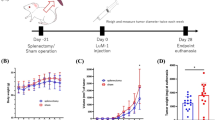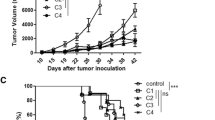Summary
The mechanism of artificial and spontaneous metastases of tumor was analyzed in B16 melanoma cells and C57BL/6 mice by using anti-asialo GM1 antibody and anticancer agents. Single administrations of 500 μg anti-asialo GM1 antibody resulted in significantly decreased NK activity in spleen cells of C57BL/6 mice, lasting 10 days from the day following administration. Treatment with anti-asialo GM1 antibody never decreased the function of T lymphocytes measured by blastogenesis with phytohemagglutinin or T cell growth factor. The tumoricidal functions of activated macrophages but not of resident macrophages were decreased by in vivo treatment with anti-asialo GM1 antibody.
The anti-asialo GM1 antibody was evaluated in terms of the enhancing effect on pulmonary metastases with regard to the timing of administration. Treatment with anti-asialo GM1 antibody 1 day before or on the day of tumor inoculation resulted in a substantial increase in the number of artificial pulmonary metastases. In the experimental system of spontaneous metastases, anti-asialo GM1 antibody most effectively increased the number of pulmonary metastases when administered 1–2 weeks before the removal of primary tumor, when the tumor cells are thought to be released into blood circulation from the primary site. In addition, accelerated growth of transplanted tumors at the primary site was observed in mice treated with anti-asialo GM1 antibody. These results strongly suggest that anti-asialo GM1 antibody enhances the incidence of in vivo tumor metastases and the growth of transplanted tumor mainly by suppressing the function of NK cells.
The maximum effective dose (MED) of mitomycin C or its derivative (M-83) suppressed NK activity significantly, and pretreatment with these anticancer agents enhanced the growth of the artificial pulmonary and liver metastases. In contrast, the MED of cDDP showed no effect on the NK activity or the numbers of pulmonary and liver metastases. These results indicate that the depression of NK activity induced by chemotherapy results in the promotion of metastatic disease.
From these studies it can be concluded that NK cells have a key role in the control of metastases of malignant disease, and that support of NK activity is very important for the prevention of metastases.
Similar content being viewed by others
References
Brooks CG, Flannery GR, Willmott N, Austin EB, Kenwrick S, Baldwin RW (1981) Tumor cells in metastatic deposits with altered sensitivity to natural killer cells. Int J Cancer 28:191–198
Gorelik E, Wiltrout RH, Okumura K, Habu S, Herberman RB (1982) Role of NK cells in the control of metastatic spread and growth of tumor cells in mice. Int J Cancer 20:107–112
Habu S, Fukui H, Shimamura K, Kasai M, Nagai Y, Okumura K, Tamaoki N (1981) In vivo effects of anti-asialo GM1. 1. Reduction of NK activity and enhancement of transplanted tumor growth in nude mice. J Immunol 127:34–39
Hanna N (1980) Expression of metastatic potential of tumor cells in young nude mice is correlated with low levels of natural killer cell mediated cytotoxicity. Int J Cancer 26:675–680
Hanna N, Burton RC (1981) Definitive evidence that natural killer (NK) cells inhibit exprimental tumor metastasis in vivo. J Imunol 127:1765–1758
Hanna N, Fidler I (1980) Role of natural killer cells in the destruction of circulating tumor emboli. JNCI 65:800–812
Herberman RB, Holden HT (1979) Natural killer cells as antitumor effector cells. JNCI 62:441–445
Kärre K, Klein GO, Kiessling R, Klein G, Roder JC (1980) Low activity in vivo resistance to syngeneic leukemias in natural killer cell-deficient mice. Nature 284:624–626
Kasai M, Iwamori M, Nagai Y, Okumura K, Tada T (1980a) A glycolipid on the surface of mouse natural killer cells. Eur J Immunol 10:175–178
Kasai M, Yoneda T, Habu S, Maruyama Y, Okimura K, Tokunaga T (1980b) In vivo effect of anti-asialo GM1 antibody on natural killer activity. Nature 291:334–335
Kawase I, Urdal DL, Broods CG, Henney CS (1982) Selective depletion of NK cell activity in vivo and its effect on the growth of NK-sensitive and NK-resistant tumor cell variants. Int J Cancer 26:567–574
Kiessling R, Wigzell H (1979) An analysis of the murine NK cells as to structure, function and biological relevance. Immunol Res 44:166–208
Mantovani A, Luini W, Peri G, Vecchi A, Spreafico F (1978) Effect of chemotherapeutic agents on natural cell-mediated cytotoxicity in mice. J Natl Cancer Inst 61:1255–1261
Ogura T, Namba M, Hiyao F, Yamamura Y, Azuma I (1979) Association of macrophage activation with antitumor effect on rat syngeneic fibrosarcoma byNocardia rubra cell wall skeleton. Cancer Res 39:4706–4712
Ojo E (1979) Positive correlation between the levels of natural killer cells and in vivo resistance to syngeneic tumor transplantations as influenced by various routes of administration ofCoryebacterium parvum bacteria. Cell Immunol 45:182–187
Pollak SB, Hallenbeck LA (1982) In vivo reduction of NK activity with anti-NK 1 serum; direct evaluation of NK cells in tumor clearance. Int J Cancer 29:203–207
Riccardi C, Puccetti P, Santoni A, Herberman RB (1979) Rapid in vivo assay to mouse natural killer cell activity. JNCJ 63:1041–1045
Saijo N, Shimizu E, Shibuya M, Irimajiri N, Takizawa, T, Eguchi K, Shinkai T, Tominaga K, Shimabukuro Z, Taniguchi T, Hoshi A (1982a) Effect of chemotherapy on natural killer activity and antibody-dependent cell-mediated cytotoxicity in carcinoma of the lung. Br J Cancer 46:180–189
Saijo N, Shimizu E, Irimajiri N, Ozaki A, Kimura K, Takizawa T, Niitani H (1982b) Analysis of natural killer activity and antibody-dependent cellular cytotoxicity in healthy volunteers and in patients with primary lung cancer and metastatic pulmonary tumors. J Cancer Res Clin Oncol 102:196–214
Saijo N, Irimajiri N, Ozaki A, Takizawa T, Niitani H (1982c) Effects of BCG and cycolophosphamide on the spontaneous and antibody-dependent cytotoxicity of peritoneal and spleen lymphocytes of ACl/N rats. Gann 73:270–277
Saijo N, Ozaki A, Beppu Y, Irimajiri N, Shibuya M, Shimuzu E, Takizawa T, Taniguchi T, Hoshi A (1983) In vivo and in vitro effects ofNocardia rubra cell wall skeleton on natural killer activity in mice. Gann 74:137–142
Author information
Authors and Affiliations
Rights and permissions
About this article
Cite this article
Saijo, N., Ozaki, A., Beppu, Y. et al. Analysis of metastatic spread and growth of tumor cells in mice with depressed natural killer activity by anti-asialo GMl antibody or anticancer agents. J Cancer Res Clin Oncol 107, 157–163 (1984). https://doi.org/10.1007/BF01032600
Received:
Accepted:
Issue Date:
DOI: https://doi.org/10.1007/BF01032600




